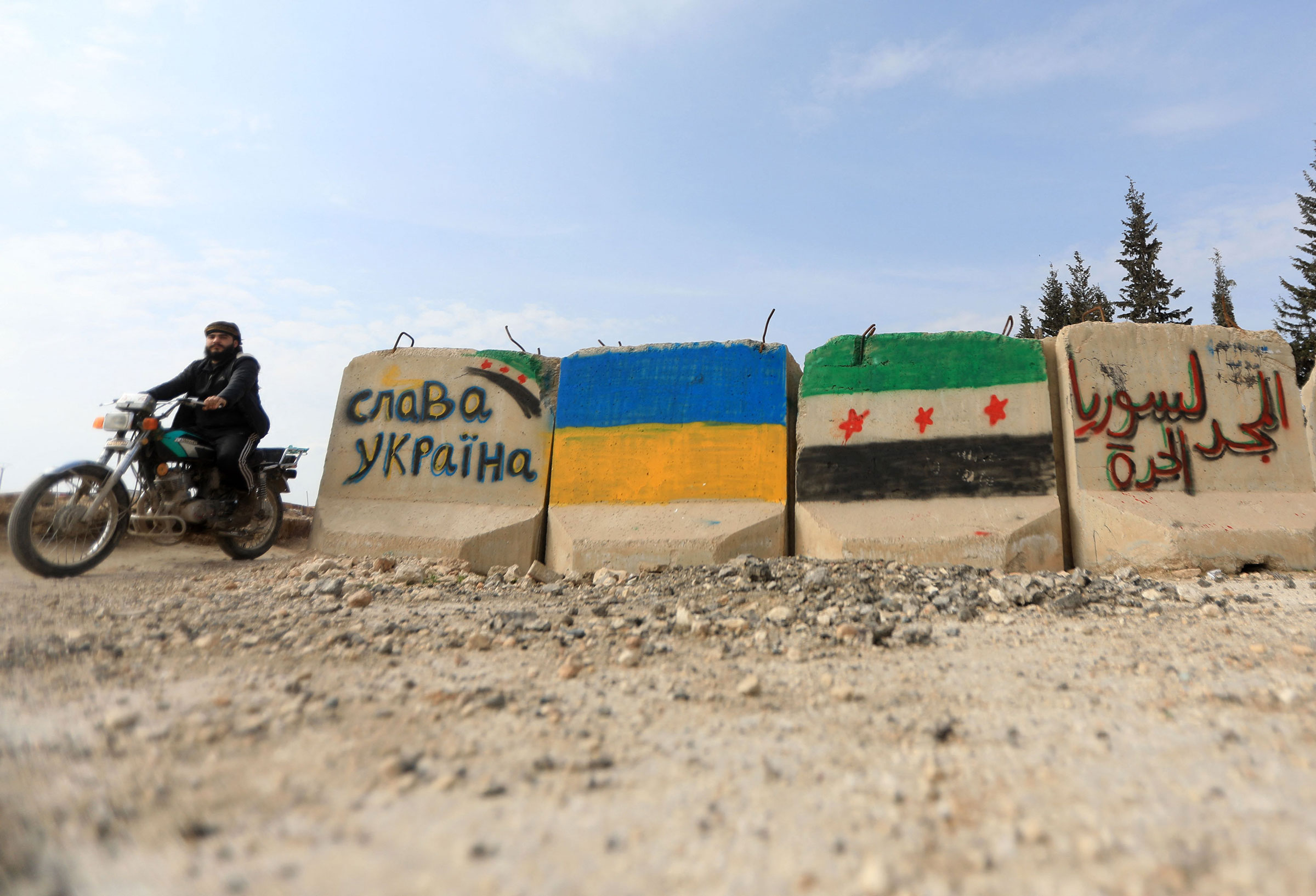
When Raed Al-Saleh first watched the video from Ukraine of an ambulance on fire and an injured paramedic lying on the ground, he immediately thought of his fallen colleagues in Syria.
Al-Saleh is the leader of the White Helmets, the famous Syrian civil rescue force that rushes to scenes of bombings to pull survivors from the rubble. The White Helmets says it has lost 252 volunteers in the course of Syria’s ongoing 11-year civil war. Many of them were killed by Russian airstrikes.
“The video reminded me of how this happened to many of my colleagues,” Al-Saleh told TIME in a phone interview on Thursday, via a translator. “The entirety of this invasion and the scenes of destruction are so reminiscent of what happened in Syria.”
On Wednesday, the White Helmets published a video of rescue workers in Syria publicly expressing solidarity with the people of Ukraine. “As first responders and rescuers, we know the tragedy, horror, and destruction that war leaves behind,” says a member of the rescue force, standing in front of a bombed-out building. “We reaffirm our solidarity with the humanitarian aid workers in Ukraine, and with the Ukrainian people.” It’s just the latest act of solidarity from the group. On Feb. 22, two days before Russian President Vladimir Putin announced the invasion of Ukraine, the White Helmets released a statement. “We deplore in the strongest terms all of the acts of Russian aggression on Ukraine people,” it said. “It pains us immensely to know that the weapons tested on Syrians will now be used against Ukrainian civilians.”
The White Helmets aren’t the only Syrians expressing solidarity with Ukraine. Hadi Al-Khatib, the founder of Syrian Archive, an online repository of evidence of potential war crimes, told TIME that he and his colleagues at the advocacy group Mnemonic are preparing to set up a body called Ukraine Archive to do digital evidence-gathering for the Ukraine conflict. Online, ordinary Syrians are sharing details with Ukrainians about how to survive living in war zones. And in the Syrian region of Idlib, a Syrian graffiti artist has created a mural of solidarity to the Ukrainian people.
Read More: How Volodymyr Zelensky Defended Ukraine and United the World
For Syrians around the world, the events of the week since the Russian invasion have been a reenactment of traumatic experiences that they wished they would never see again. For many, including Al-Saleh, it was also an indictment of what they say was the West’s failure to crack down hard enough on Russian aggression in Syria. “Because of the lack of accountability over what Russia did in Syria, Russia felt that it was free to do whatever it wanted in Ukraine,” Al-Saleh says. “That gave an impression not only to Russia, but to other dictatorships across the world, that they can act with impunity and get away with grave violations of human rights and international law.”
Further evidence is emerging from Ukraine of indiscriminate Russian attacks on civilians and healthcare facilities. On Feb. 24, a Russian cluster munition hit outside a Ukrainian hospital in the Donetsk region of the country, killing four civilians and injuring 10 more, including six health care workers, according to Human Rights Watch. Cluster munitions were banned by an international convention in 2010 due to their indiscriminate nature and high likelihood of harming civilians – though neither Russia nor the U.S. are signatories to that treaty.
On Feb 25, cluster munitions hit a preschool where civilians were sheltering, killing a child and two others, according to Amnesty International. “This attack bears all the hallmarks of Russia’s use of this inherently indiscriminate and internationally-banned weapon, and shows flagrant disregard for civilian life,” said Agnes Callamard, Amnesty’s secretary general, in a statement after the attack.
Read More: The Untold Story of the Ukraine Crisis
The use of cluster bombs in Ukraine reminds Al-Saleh of an attack on a Syrian hospital in a rural area outside Aleppo. “It’s very hard for me to forget the scenes that came out of there,” he says. “And it wasn’t just rural Aleppo, it was the city itself. It was Damascus, it was Homs, it was Idlib. So many places were targeted with cluster munitions. And the scenes from Ukraine are so reminiscent of that.” He worries that indiscriminate bombing of urban areas on a massive scale, like he saw in Syria, might be coming soon to Ukraine with an even greater intensity. “I fear that history will repeat itself,” he says.
If Al-Saleh has any hope at all, it is that the crisis in Ukraine will make it easier to bring Russia to justice. “I would like to see an investigation and a case brought to the International Criminal Court that would set a precedent and open the door for the prosecution of other crimes committed by Russia – not just in Ukraine, but also in Syria,” he says. “Russia needs to be held accountable.”
More Must-Reads From TIME
- The 100 Most Influential People of 2024
- Coco Gauff Is Playing for Herself Now
- Scenes From Pro-Palestinian Encampments Across U.S. Universities
- 6 Compliments That Land Every Time
- If You're Dating Right Now , You're Brave: Column
- The AI That Could Heal a Divided Internet
- Fallout Is a Brilliant Model for the Future of Video Game Adaptations
- Want Weekly Recs on What to Watch, Read, and More? Sign Up for Worth Your Time
Write to Billy Perrigo at billy.perrigo@time.com